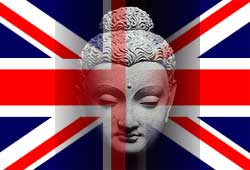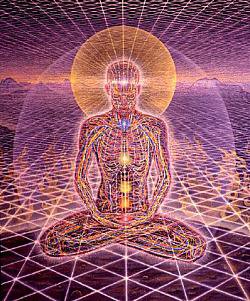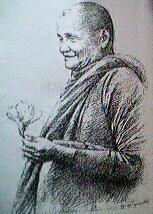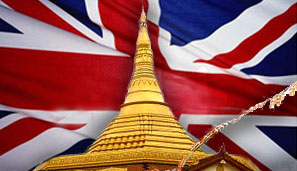 Having finally settled down in Britain, I can now inform you how I got here by telling you about what's been happening over the last couple of months.
Having finally settled down in Britain, I can now inform you how I got here by telling you about what's been happening over the last couple of months.November 5th I left Taiwan, having said rather poignant farewells at the airport to venerables Hui Mu and Hui Shou (the former from Taiwan and the latter from Austria) with whom I had got on extremely well. Not only they, but everyone (save one exception) with whom I'd dealt at Fo Guang Shan treated me very kindly.
After an 11-hour flight across the vast Pacific (just think nothing but water between Taipei and California!) I landed in San Francisco. Although I'd been away from the City by the Bay for only some five and a half months, it nonetheless felt like it had been much, much longer, because I had experienced so much during that relatively short time span.
Also, for the very first time in over 20 years, I was landing in San Francisco without a home of my own to go to: the realization that I'd some months before chosen the homeless life tangibly dawned on me upon my arrival home.

Taking him up on his kind offer to stay at his place for a while, soon I found myself settled at my friend Brandon's homebeen
Describing life in western Buddhist monastery, I can only talk about how the winter retreat schedule, because we are now doing the winter retreat. It began January 7th and ends March 28th.
The bell rings each morning at 4:00am: some people get up; others stay in bed. I get up and take a shower. There is no set shower time, so it is your individual choice when you shower.
At 5:00am, we have a one-hour morning meditation in the shrine room - monks and men on one side; nuns and women on the other side. After the meditation, we have a short 10-15 minute puja, in which we chant suttas (= sutras) either in English, Pali or both languages.
At 6:30am we all do our chores. Chores are obligatory; so, if someone chose not to get up for meditation, nonetheless, they MUST get up to do their chores. My chore is to vacuum ("hoover" in British English) half the shrine room as well as the corridor on the men's side of the retreat centre.
After chores are completed, porridge is served at 7:15am. No one lines up here. Each individual just goes to the sala (the area where we eat) whenever they wish and serve themselves as much or as little porridge as they may want. The porridge is taken away at 8:15am. I (and many of the monks, as well) choose not to eat breakfast. I instead go to the media room to check my e-mail or just surf the Internet for a bit.
After porridge, about 6 or 7 people, who had previously signed up, go to work in the kitchen to prepare the main (and last) meal of the day. Those who do not have kitchen duty, go to the shrine room for sitting meditation from 8:30 to 9:15. Then, there is walking meditation from 9:20 to 9:55, then sitting meditation again from 10:00 until 10:45.
 The main meal (lunch) is served at 11:00, because the Vinaya states that bhikkhus must only eat between dawn and midday. Before the meal, there two monks go up to the servery and two or three lay people officially "offer" them the food. After this ceremony, there is chanting, which mostly is dedicated to someone by someone else who brought a donation of food (dana) just offered to the monks. After chanting, the monks, followed in order by the nuns, the anagarikas (pre-novice monks) and lastly the anagarikaas (pre-novice nuns) walk up to the servery to serve themselves their last meal of the day. After the monastics have all served themselves, the most senior monk rings a bell signaling that the laity may now go get some food, as well. There is always more than enough food; it's mostly very English: potatoes, carrots, cabbage, bread, lentils, or other beans, apples and bananas for dessert. However, many Thai and Sri Lankan laity do bring very tasty dishes from their home countries, so occasionally we have daal, pineapple, coconut and other very exotic (i.e. non-English) food, as well.
The main meal (lunch) is served at 11:00, because the Vinaya states that bhikkhus must only eat between dawn and midday. Before the meal, there two monks go up to the servery and two or three lay people officially "offer" them the food. After this ceremony, there is chanting, which mostly is dedicated to someone by someone else who brought a donation of food (dana) just offered to the monks. After chanting, the monks, followed in order by the nuns, the anagarikas (pre-novice monks) and lastly the anagarikaas (pre-novice nuns) walk up to the servery to serve themselves their last meal of the day. After the monastics have all served themselves, the most senior monk rings a bell signaling that the laity may now go get some food, as well. There is always more than enough food; it's mostly very English: potatoes, carrots, cabbage, bread, lentils, or other beans, apples and bananas for dessert. However, many Thai and Sri Lankan laity do bring very tasty dishes from their home countries, so occasionally we have daal, pineapple, coconut and other very exotic (i.e. non-English) food, as well.After the main meal, about 6 or 7 people, who had previously signed up, go to the kitchen to clean up. The rest of the people (there are about 60 people including monastics and laity at the monastery) have free time until 2:00pm. Some people nap, others read, and others go for a walk or just have a chat.
At two in the afternoon, we meditate in the shrine room for one hour. At 3:00pm, an hour is set aside for walking meditation. At four we return to the shrine room for another hour's sitting meditation.
All of the meditation sessions are optional. Some people choose to do other things during the times scheduled for meditation and that's okay.
At 5:00pm, we have tea (This IS England!). But, while we're enjoying our tea with milk (be it soya or cow's), we engage in other activities: sutta classes, Dhamma discussion groups, films, yoga classes, laypeople's meetings. These activities likewise are optional.
At 7:30, we enjoy one last hour of sitting meditation, which so far as I've witnessed, everyone attends. This last sitting is followed by a brief puja to end the day. Afterwards, everyone returns to their rooms for sleep.
 Every Thursday, a monastery van takes up to ten people (who've signed up previously) for trips to town: alternating between Berkhamsted - the closest village - and Hemel Hempstead - the nearest town -. We stay in town for two answers, during which time we can go to the library, get cash at the ATM ("cash point" in British English), go shopping for toiletries, etc. or do whatever else we feel like doing.
Every Thursday, a monastery van takes up to ten people (who've signed up previously) for trips to town: alternating between Berkhamsted - the closest village - and Hemel Hempstead - the nearest town -. We stay in town for two answers, during which time we can go to the library, get cash at the ATM ("cash point" in British English), go shopping for toiletries, etc. or do whatever else we feel like doing.
No comments:
Post a Comment